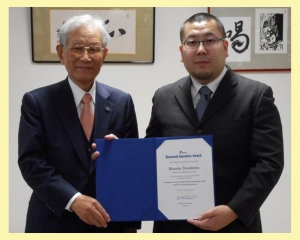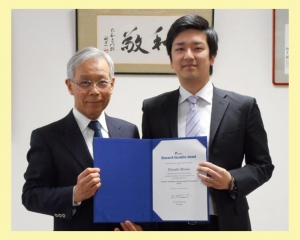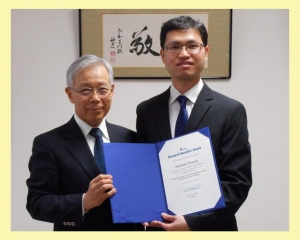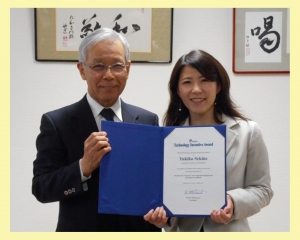Four young BSI scientists win RIKEN Researcher/Technician Incentive Award 2016
The Researcher Incentive Award and Technical Incentive Award are given to young researchers and technicians who have contributed to furthering RIKEN’s ideals by achieving exemplary results in their research support activities. In fiscal year 2016, three researchers and one technician from BSI were selected as awardees. Congratulations!
April 19, 2017
Research Scientist, Lab for Molecular Psychiatry
■ Achievement
Elucidation of neuronal differentiation abnormality in iPS cells from schizophrenia patients
■ Reference Paper
Toyoshima M, Akamatsu W, Okada Y, Ohnishi T, Balan S, Hisano Y, Iwayama Y, Toyota T, Matsumoto T, Itasaka N, Sugiyama S, Tanaka M, Yano M, Dean B, Okano H, Yoshikawa T. Analysis of induced pluripotent stem cells carrying 22q11.2 deletion, Translational Psychiatry, 2016
 |
I am very honored to receive this award. I am wishing to develop my iPSC studies by harnessing genome-editing technology.
|
Research Scientist, Lab for Neuron-Glia Circuitry
■ Achievement
Gliogenic mechanism of transcranial DC stimulation (tDCS)
■ Reference Paper
Monai et al., Calcium imaging reveals glial involvement in transcranial direct current stimulation-induced plasticity in mouse brain, Nature Communications, 2016
 |
This work shows that noradrenaline-mediated astrocytic Ca2+ elevation plays an essential role in transcranial direct current stimulation (tDCS)-induced plasticity in mouse brain. I am very grateful for my family.
|
Research Scientist, Lab for Neural Computation and Adaptation
■ Achievement
Statistical mechanics of neural population codes by unsupervised feature learning
■ Reference Paper
a. H. Huang and T. Toyoizumi, Clustering of neural code words revealed by a first-order phase transition, Physical Review E, 2016
b. H. Huang and T. Toyoizumi, Unsupervised feature learning from finite data by message passing: Discontinuous versus continuous phase transition, Physical Review E, 2016
 |
I am very happy to receive this award, a big encouragement to me for pursuing fundamental theoretical basis of neural population codes and unsupervised learning. We currently continue our efforts to study the low dimensional structure of neural code words space in retinal ganglion neural network, which may provide neural mechanisms to understand sensory stimuli processing and associated error-correction properties. In addition, we have a future goal to understand the basic properties and neural algorithms of unsupervised learning, which human and non-human animals rely on in their daily life. Furthermore, this study may open the possibility to use the cheap unlabeled data for hierarchical feature extraction in deep learning of practical interest. |
Technical Staff I, Lab. for Memory Mechanisms
■ Achievement
Visualization of memory trace under physiological and pathological conditions
■ Reference Presentation
Temporal coding of reward event by subpopulations of hippocampal CA1 pyramidal neurons K. Mizuta1, M. Sato, Y. Sekine, M. Kawano, T. Islam, R. Takamura, T. Masumoto, T. Takekawa, M. Ohkura, T. Fukai, J. Nakai, Y. Hayashi, Society for Neuroscience, Nov. 2016
 |
It is my honor to have received such a special award.
I believe this award recognizes the work of not just myself but all of the laboratory members working with me. I would like to thank RIKEN and Dr. Yasunori Hayashi for giving me this outstanding opportunity. I will continue to give my very best to our research field in order to contribute to its development. |